#samuel johnson
Text

“Integrity without knowledge is weak and useless, and knowledge without integrity is dangerous and dreadful.”
— Samuel Johnson
#samuel johnson#literature#lit#literature lover#literature quote#literature quotes#english literature#philosophy#philosophical#philosopher#philosophers#philosophy of life#philosophy quote#philosophy quotes#quote#quotes#excerpts#excerpt#quoteoftheday#booklover#book#bookworm#books#booklr#book quotes#book quotations
149 notes
·
View notes
Photo






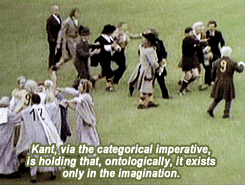

I have tried too in my time to be a philosopher; but, I don't know how, cheerfulness was always breaking in.
- Dr Samuel Johnson
Monty Python’s Philosopher’s football match: Greece vs Germany.
#dr johnson#samuel johnson#quote#monty python#philosophy#philosopher football match sketch#greece#germany#comedy#funny#humour
475 notes
·
View notes
Text
Shakespeare Weekend
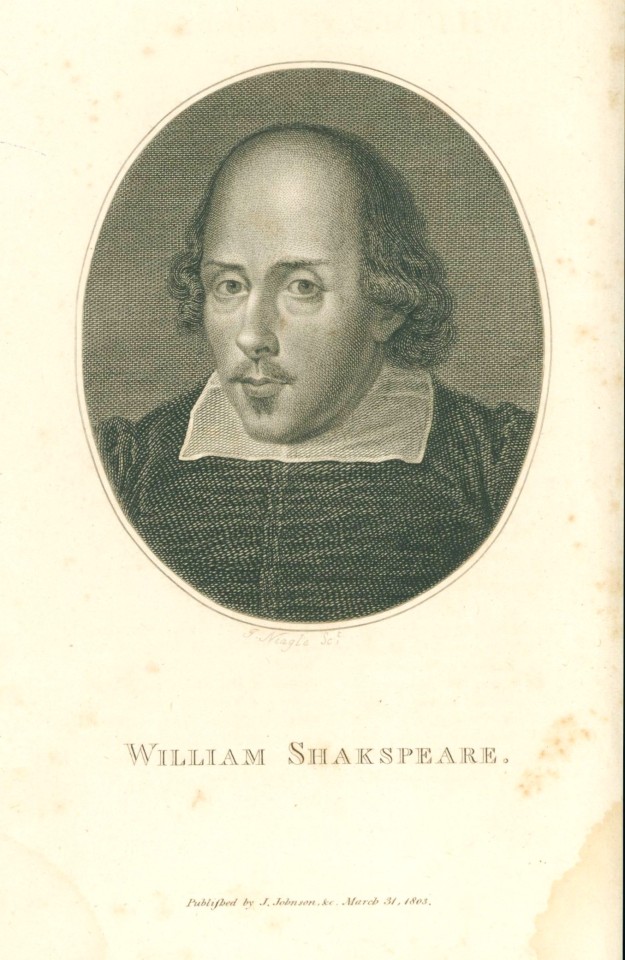
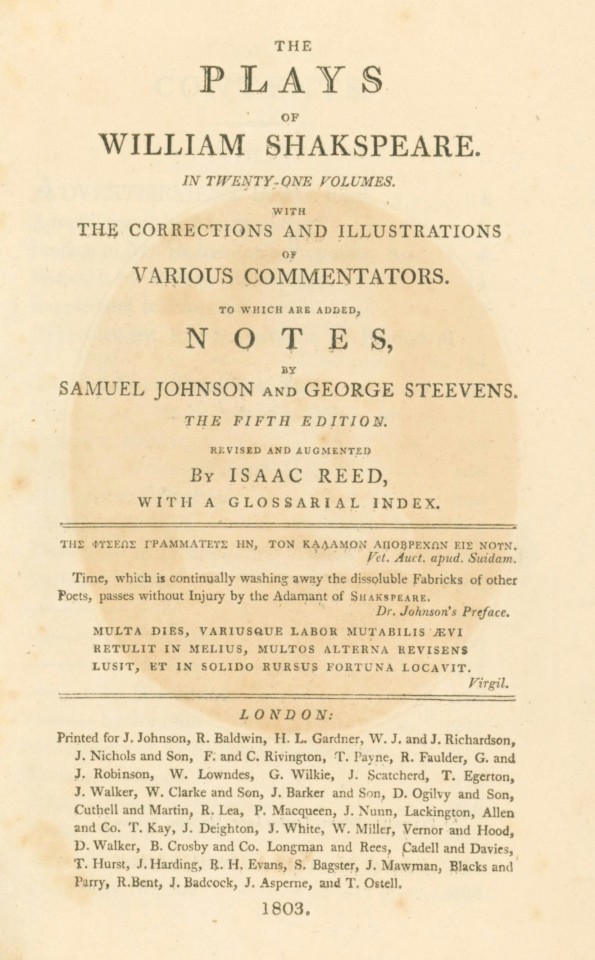
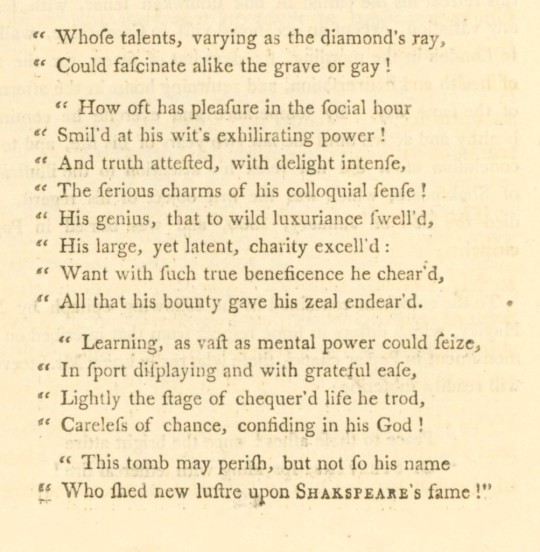
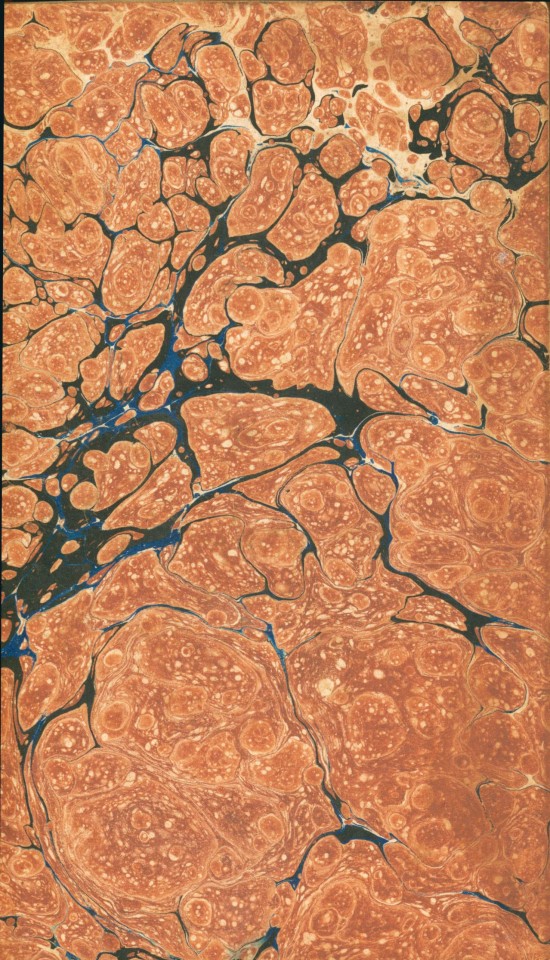
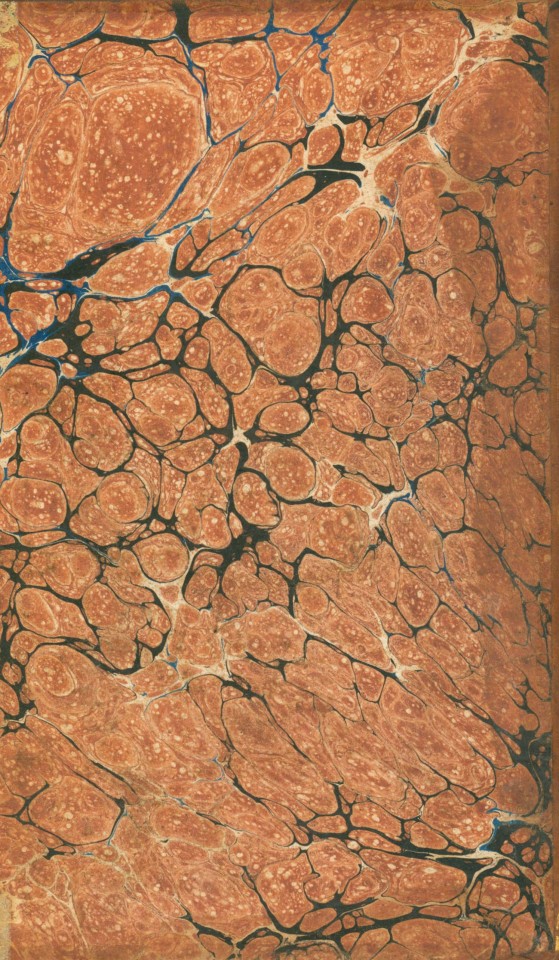
In 1803 Joseph Johnson (1738-1809) published the fifth edition of The Plays of William Shakespeare, in twenty-one volumes, with the corrections and illustrations of various commentators to which are added notes. Originally written by Samuel Johnson (1709-1784) and George Steevens (1736-1800), this fifth edition was edited by Isaac Reed (1742-1807) and became known as the first variorum edition of Shakespeare.
Reed’s collation of previous variations of Shakespeare proved to be a massive undertaking (twenty-one volumes!) that would be reprinted in 1813 and inspire future variorums like that of James Boswell the Younger in 1821 and the New Variorum Shakespeare Project that began in the 1870s and continues to this day as an official project of the Modern Language Association of America (which, btw, was headquartered here at the UWM libraries for 20 years, and the reason we have such a strong Shakespeare collection). The edition opens with a frontispiece engraving of Shakespeare by British engraver James Neagle (d. 1822) followed by an advertisement by Reed. Reed takes this opportunity to sing Steevens praises, including a eulogy written by William Hayley that reads in part “This tomb may perish, but not so his name who shed new lustre upon Shakespeare’s fame!”
Volume One continues with various prefaces and essays by the usual Shakespearean scholars and critics of the time, Malone, Pope, Warburton and of course Nicholas Rowe’s Life of Shakespeare. Printed by John Plymsell out of London, our edition features marble endpapers in a Stormont pattern.
View more Shakespeare Weekend posts.
-Jenna, Special Collections Graduate Intern
#joseph johnson#samuel johnson#george steevens#isaac reed#variorum#shakespeare#william shakespeare#shakespeare weekend#james neagle#engraving#edmond malone#alexander pope#william warburton#nicholas rowe#the plays of william shakespeare
21 notes
·
View notes
Text
I should be working on my dissertation, and have been, but I thought it'd be fun (for me :P) to loop you all in somehow. Therefore I bring you a very silly poll!
*best means whatever it means to you; feel free to propagandize
**yes, I deliberately excluded Shakespeare (from the poll, not the dissertation, lol)
#anghraine babbles#poll nonsense#ivory tower blogging#dissertation hell#william wordsworth#john ford#daniel defoe#thomas middleton#john webster#samuel johnson#edmund spenser#samuel richardson#michel de montaigne#henry fielding#olaudah equiano#jonathan swift#renaissance blogging#(read: early modern blogging but i'm too lazy to change my original tag)#eighteenth century blogging#sixteenth century blogging#seventeenth century blogging
23 notes
·
View notes
Note
I went to a lot of comic cons in college. My impression was that most of the creators were… creatives. People that spend long hours in front of a drawing board or a typewriter, building worlds out of the aether that is their brain(s). That’s illustration to me. Physically manifesting the metaphysical, moment by moment. Picking the best moments for each beat of the story.
I -flat out- went to school to be a comic book artist. I just cannot fathom feeding my wife and my boys by manifesting the images in my head into a monthly income. But hey, that’s me. Your work is a continuous source of inspiration and joy for me.
My eldest son loves the power rangers. He he drew the green ranger in pencil on a canvas. He then painted the drawing with acrylic. He had a full-on meltdown when the painting didn’t look as good as he wanted it to look.
I sat with him and explained the process of creating comic book artwork. From blueline to publication. I spoke with him about the value of perseverance, and the value of using mixed media. He waited a day and then outlined his painting with Sharpie. He BEAMED with pride when he showed me the final product. Made me so, so happy.
Rodin was a hack. Dude had no deadlines, and no narrative outline.
Keep being awesome. You are an inspiration to me, to my boys, and to generations to come.
I am so glad you are encouraging your son to make art and enjoy it, and it is great that you find so much to appreciate in comic art and have so much respect for those who make it. We all truly appreciate it.
A few thoughts, if I may.
If you want your son to understand and appreciate mixed media, you might want to move him away from using markers like Sharpies.
If you are concerned about the longevity of the original art, I regret to inform you alcohol based markers such as Sharpies and Copics are not lightfast. That is to say, they fade on exposure to UV light. They do not use pigmented inks, they use dyes.
The fading may not happen today, it may not happen tomorrow, but it will happen sooner than you would like. Many well-known cartoonists who used Sharpies on their original comic pages, or did commissions sketches using them, have seen the art fade markedly (pun intended) over time.
Here's what that looks like.

This Klaus Janson commission has just about gone home to Jesus.
Try to switch to pigment based markers, such as those from Faber Castell, or go wild and learn to use a crow quill.
Also, while I truly appreciate your kind compliments, it's not necessary to do that at another artist's expense.
Rodin was the complete opposite of the definition of "hack".
A hack is a term originally used for one who works on tight deadlines to publisher specifications, and produces poor quality work.
That's not Rodin.
Rodin was a spectacular talent who earned his place in the canon. He came from humble beginnings and spent the first two decades of his career sculpting decorative architectural elements. He obtained his place as a fine artist after many years of struggle.
And even then, a fine artist often works to deadline, as there are salons and exhibit specs that must be met, as well as the requirements of patrons and clients, to say nothing of the grueling formal training aspiring artists were subjected to in the ateliers.
His work often contains strong narrative elements as well, as evidenced by his design for The Gates of Hell.
In fact, for most of the history of modern art, narrative elements were considered anti-art. As someone who prefers 19th century genre art, this attitude is bummerific.
The term "hack" comes from the 17th century term "Grub Street Hacks".
Back in the day writers did not get royalties. Bookstores usually published books and paid writers a flat fee and never another penny, which resulted in a lot of very broke writers, or writers who came from wealthy families who could afford to scorn the sordid topic of coin.
Grub Street was located in London where a lot of book publishers were housed next to brothels and flophouses. It's now known as Milton Street. This area was the location of the lowliest of the low publishing joints.
The great Samuel Johnson was once a Grub Street Hack.
I've just read the most wonderful book about Samuel Johnson which has many amazing details about the development of publishing. The Club: Johnson, Boswell and The Friends Who Shaped an Age. My highest recommendation, though some will be very upset by attitudes and behaviors toward the women in these men's lives.
Johnson, despite many years of poverty, was able to escape after his work eventually earned him a royal pension. When well-thought of creative people couldn't make royalties, they were supported by wealthy patrons and the royal pension system.
While I don't have a formal education, I spent many years doing research for auction catalogues and ghost writing articles about art history, which is why I am annoyingly pedantic about it all to this day.
63 notes
·
View notes
Text
Boswell’s only note after an evening with Dr Johnson
Nothing about the food, the wine, the subjects
of that night’s passions. Nothing even about
the weather—rain most likely, the damp seeping
under doors. Just those two words for a night
when everything else slipped into the vacancies
of the unrecorded. That’s all that’s left. We know
now the more complete story that Boswell chose
not to tell: the good doctor’s wearied martyr’s gaze
as he walked the alleyways where the poor remained
poor, the blind, blind, where the only lesson learned
from suffering was how much better it would be
not to suffer. We know, too, that Johnson wanted
about this time to rest in God and yet could not
imagine how to surrender himself to a future
he couldn’t anticipate; he couldn’t help but believe,
to his dismay, that all life needed to go wrong was
the hope it would go right. Too many could not see
how evil fouled the gears of the century’s benign God.
He was headed for another breakdown; Mrs Thrale
had already been secretly entrusted with a padlock
and chain to restrain his fits when the time came.
But on this particular evening, happiness must have
arrived when he least expected it. A few hours
when everyone’s burdens were shouldered, when
there was no tomorrow sprouting its thousand forms
of grief and humiliation and defeat. Just jokes
and small talk, and wine sweetened with oranges
and sugar tumbling down the doctor’s throat.
A night, perhaps, when all the timorous and beaten
faces suddenly brightened in their common temple
of laughter. A night when even a stray black dog
might have been allowed to lick clean a patron’s
greasy hands and warm its flea-bitten belly
near the fire. A night caught in the genius and irony
of Boswell’s two words—what they left unsaid
and what they say, the simple phrase like a pardon
after our sins have been listened to one by one,
and there is nothing left to remember but ‘much
laughter’ after another day on earth is done.
Robert Cording, Much laughter (in ‘Common Life: Poems’, CavanKerry Press 2006)

11 notes
·
View notes
Photo

Wallace Polsom, An Exotic and Irrational Entertainment (2022), paper collage, 25.1 x 32.2 cm.
#wallace polsom#an exotic and irrational entertainment#paper collage#collage#collage art#art#artists on tumblr#analog collage#contemporary art#handmade collage#handcut collage#21st century#wallacepolsom2022#surreal#surrealism#samuel johnson
241 notes
·
View notes
Note
What is Shakespeare's biggest flaw?
I agree with Samuel Johnson that the constant punning gets old, even sometimes trivializes his subject matter. That among other reasons is probably why we prefer the tragedies to the comedies, where the punning is more prominent. And the fact that Shakespeare is admired or even revered in other cultures (German, Russian, Japanese, etc.) where he's read in translations that can't possibly capture all the wordplay suggests to me that it is not the most essential aspect of his achievement. Johnson wrote in his Preface to Shakespeare:
A quibble [pun] is to Shakespeare, what luminous vapours are to the traveller; he follows it at all adventures; it is sure to lead him out of his way, and sure to engulf him in the mire. It has some malignant power over his mind, and its fascinations are irresistible. Whatever be the dignity or profundity of his disquisition, whether he be enlarging knowledge or exalting affection, whether he be amusing attention with incidents, or enchaining it in suspense, let but a quibble spring up before him, and he leaves his work unfinished. A quibble is the golden apple for which he will always turn aside from his career, or stoop from his elevation. A quibble, poor and barren as it is, gave him such delight, that he was content to purchase it, by the sacrifice of reason, propriety and truth. A quibble was to him the fatal Cleopatra for which he lost the world, and was content to lose it.
This doesn't apply to the sonnets, though, where the wordplay is both exceptional and more genre-appropriate in compressed lyric poetry.
9 notes
·
View notes
Text
No man was more foolish when he
had not a pen in his hand, or more
wise when he had
(Samuel Johnson)
21 notes
·
View notes
Photo

Source details and larger version.
Writers might enjoy my modest collection of vintage writers.
14 notes
·
View notes
Text
“History, in other words, allows people to achieve distance from the era in which they were born, and promotes what one might call social sanity. It is not, as some have shamefully claimed, a form of psychological escapism—at least Johnson didn't think so. Neither did C.S. Lewis, who said that ‘[t]o study the past does indeed liberate us from the present, from the idols of our own marketplace.’ The historian, he said, ‘has lived in many times and is therefore in some degree immune from the great cataract of nonsense that pours from the press and the microphone of his own age.’ As Solzhenitsyn feared, without the ballast of the past, the present can easily be capsized by the ruthless and the power hungry.”
— Allen Guelzo, National Affairs, Summer 2022.
80 notes
·
View notes
Photo

Wine makes a man more pleased with himself; I do not say that it makes him more pleasing to others.
- Samuel Johnson
173 notes
·
View notes
Text
Milestone Monday


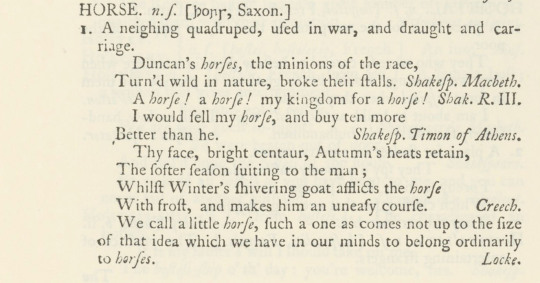


Happy National Dictionary Day!
Although the day was introduced to honor the birthday of American lexicographer Noah Webster, we are more interested in his innovative predecessor Samuel Johnson (1709-1784). Johnson was an English writer with credits as a poet, playwright, essayist, literary critic, sermonist, biographer, editor, and lexicographer. In 1746, he was approached by a group of publishers to create an authoritative English dictionary and agreed, boasting he could complete the dictionary within three years. In the end, he single-handedly completed the task within eight years utilizing only clerical assistance.
Johnson’s A Dictionary of the English Language was first published in London by noted Scottish printer and publisher William Strahan on April 15, 1755. While certainly not the first dictionary, it was groundbreaking in its documentation of the English lexicon providing not only words and their definitions, but examples of their use. Johnson accomplished this by illustrating the meanings of words through literary quotes, often citing Shakespeare, Milton, and Dryden. He also introduced lighthearted humor into some of his definitions, most notably describing a lexicographer as “a writer of dictionaries; a harmless drudge that busies himself in tracing the original and detailing the signification of words”. Of equal amusement, oats are defined as “a grain which in England is generally given to horses, but in Scotland supports the people”.


A Dictionary of the English Language was published in two volumes with volume one containing A-K and volume two L-Z. Its pages were 46 cm tall and 51 cm wide, and it is said that outside of a few special editions of the Bible no book of this size and bulk had been set to type and that no bookseller could print it without help. Johnson’s dictionary was the pre-eminent dictionary for over 100 years until the completion of the Oxford English Dictionary in 1884. Despite some criticism about his etymology and orthoepic guidelines, Johnson’s dictionary was tremendously influential in its methodology for how dictionaries should be constructed and entries presented, casting a shadow over all future dictionaries and lexicographers.
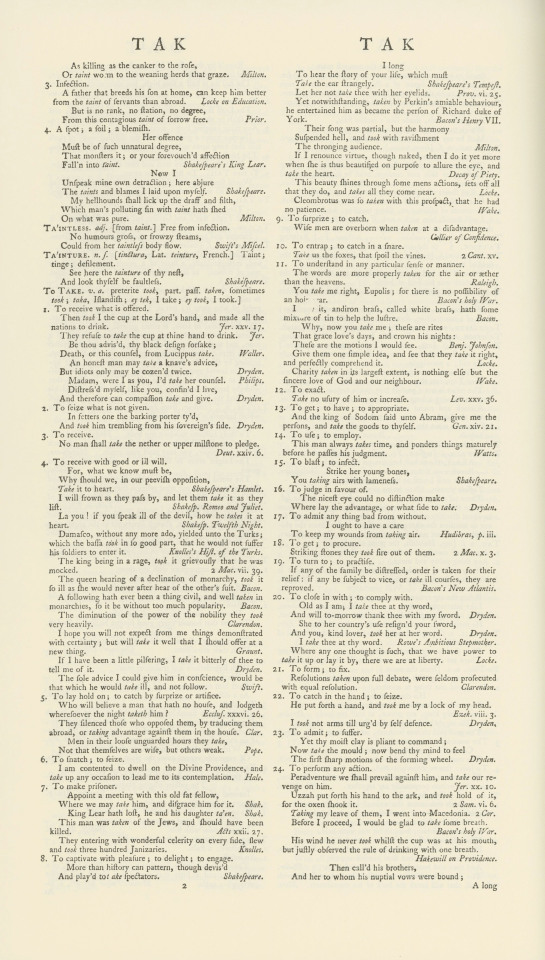
Several of the words in Johnson's dictionary were painstakingly defined. "Take" has 134 definitions running 8,000 words over 5 pages.

Woodcut tailpieces adorn the dictionary interspersed between letters.
Special Collections holds a facsimile reproduction of Johnson's dictionary, published in 1967 by AMS Press of New York.

View other Milestone Monday posts.
-Jenna, Special Collections Graduate Intern
#Milestone Monday#milestones#national dictionary day#holidays#a dictionary of the english language#samuel johnson#w. strahan#William Strahan#milestonemonday#lexicographers#woodcuts#AMS Press#tailpieces#dictionaries#English dictionaries#lexicography
29 notes
·
View notes
Text
A wise man will make haste to forgive, because he knows the true value of time, and will not suffer it to pass away in unnecessary pain.
Samuel Johnson
5 notes
·
View notes
Text
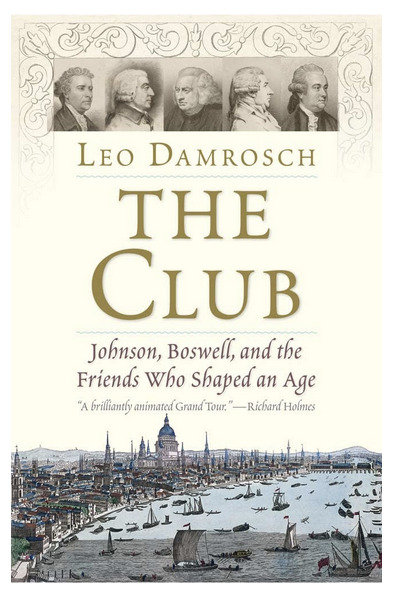
Highest recommendation, really enjoying this on audible, but so good I think I need the print version.
The Club: Johnson, Boswell, and the Friends Who Shaped an Age, outstanding book and a must read for anyone interested in the history of publishing, goes into detail about writing in days before royalties, the "Grub Street Hacks" and more. Fascinating.
16 notes
·
View notes
Note
That old timey man with fluffy hair is samual Johnson, famous 18th century writer most famous for his dictionary.
Okay but you did not answer the most important question: would he be delighted to be made into a meme, or enraged?
#samuel johnson#another fine sam#i mean maybe#all i know about him is the dictionary#which said oats are for horses in england and mem in Scotland
42 notes
·
View notes